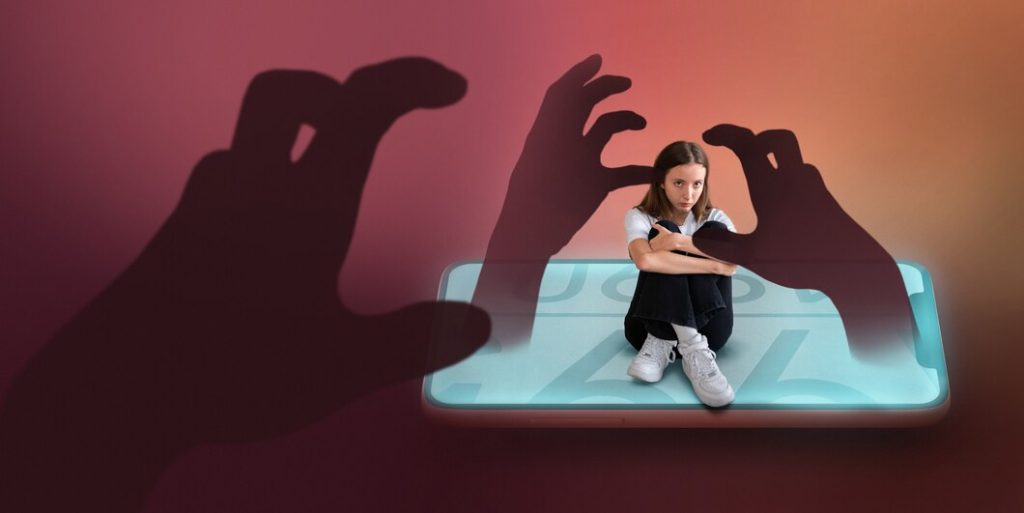
Online child abuse, a serious and growing issue, involves any form of mistreatment or exploitation of a minor over the Internet. This can range from cyberbullying and grooming to more severe forms such as sexual exploitation.
As we increasingly integrate digital connectivity into our lives, it’s crucial that we also turn our attention to the serious problems that have surfaced in its wake. Online child abuse is one such issue with severe consequences, making it a pressing matter that we need to understand and address effectively.
Shedding light on this significant topic can help enhance our understanding and awareness, emphasizing the importance of legal intervention in tackling such deeply rooted issues.
What Is Online Child Abuse?

Online child abuse encompasses a variety of harmful behaviors and actions directed towards children via the internet or other digital technologies.
One common form of online child abuse is cyberbullying, which involves the use of digital communication tools to harass, threaten, or harm a child. Another form is grooming, where an adult builds an emotional connection with a child to gain their trust for sexual exploitation or trafficking purposes. Furthermore, the sharing and production of explicit images or videos involving minors also constitutes online child abuse.
The global statistics surrounding online child abuse are alarming. According to data from the National Center for Missing & Exploited Children, 89.9% of CyberTipline reports in 2022 involved child sexual abuse material uploaded by individuals residing outside the United States.
The prevalence rate of online child sexual abuse was recorded at 15.6%. Disturbingly, one in six US children experiences online sexual abuse, with rates particularly high for girls (23%) and transgender or gender-fluid children (20%).
As we look closely into this topic, it’s important to note that help is available for those affected by these issues. For instance, this website offers legal assistance to victims of online child abuse, providing them with the resources they need to navigate the complex legal landscape.
The Legal Aspects of Online Child Abuse
Online child abuse is a crime recognized at both national and international levels. Various laws have been enacted globally to tackle this problem and hold perpetrators accountable.
In the United States, federal laws such as the Protect Our Children Act of 2008 and the Victims of Child Abuse Act of 1990 provide a legal framework for prosecuting online child abuse cases. These laws impose severe penalties for individuals found guilty of such offenses, including imprisonment and hefty fines.
Internationally, frameworks like the United Nations Convention on the Rights of the Child and the Council of Europe’s Lanzarote Convention also address online child abuse. These conventions require member states to enact laws prohibiting all forms of child exploitation and to take measures to protect children from such abuses online.
The potential legal consequences for perpetrators are severe. Besides imprisonment and fines, they may also face social ostracization and lifetime registration as a sex offender, which can significantly impact their personal and professional lives.
How A Lawyer Can Help In Online Child Abuse Cases

In cases of online child abuse, the role of a lawyer is crucial. They serve as the bridge between victims and the often complex legal system, providing guidance, support, and representation.
Lawyers can help victims and their families understand the intricacies of the legal process, explaining the various laws and regulations that apply to their cases. This understanding can be critical in making informed decisions about how to proceed, such as whether to file charges or seek a protective order.
Moreover, lawyers can assist in gathering essential evidence for the case. This might involve tracking digital footprints, subpoenaing internet service providers, or working with forensic experts to recover deleted material. Collecting solid evidence can significantly strengthen the victim’s case, increasing the likelihood of a successful prosecution.
Once charges are filed, a lawyer acts as the victim’s advocate in court. They argue on behalf of the victim, presenting the gathered evidence and challenging the defense’s arguments. Their expertise and advocacy can be instrumental in securing justice for the victim.
Beyond the courtroom, lawyers can also provide emotional support and resources to help victims and their families cope with the traumatic aftermath of online child abuse. Law firms offer comprehensive services to ensure victims receive the justice they deserve while supporting them through the healing process.
Preventive Measures And Legal Recourse
Preventing online child abuse requires a multi-faceted approach. It begins with digital literacy and online safety education for both children and their guardians. Understanding the potential dangers of the digital world, identifying suspicious activities, and learning about secure online behavior can provide a first line of defense against online abuse.
Another preventive measure is using parental controls and monitoring tools on digital devices. These tools can help guardians regulate a child’s online activities, blocking inappropriate content and flagging potentially harmful interactions.
When prevention fails, it’s essential to know how to report online child abuse. In many jurisdictions, reports can be made directly to law enforcement or through dedicated hotlines and online platforms. Prompt reporting can lead to quicker intervention, preventing further harm to the child.
Victims and their families can seek legal recourse by filing charges against the perpetrator, seeking protective orders, and pursuing civil claims for damages. A lawyer can guide victims through these processes, ensuring they understand their rights and options.
Conclusion
If you suspect a child is being victimized online, don’t hesitate. Seek legal help immediately. Every moment counts in stopping the abuse and starting the healing process. With the right guidance and resources, victims of online child abuse can achieve justice and move forward with their lives.
As a society, we must work together to protect our children and hold perpetrators accountable for their actions. Let’s continue raising awareness and advocating for stronger laws to combat this heinous crime. Together, we can make a difference in ending online child abuse.
Read Also:
- How To Get Free Qualified Help For An Injury Lawsuit
- 5 Essential Legal Tips To Know Before You Hire A Lawyer
- The Importance Of Trademark Statement Of Use For Businesses

![Roblox Class Action Lawsuit: Who Can Help You & What To Do? [Complete Legal Guide]](https://lawyersinventory.com/wp-content/uploads/2026/02/roblox-class-action-lawsuit-100x100.png)









0 Reply
No comments yet.